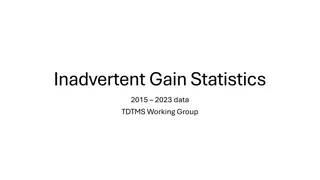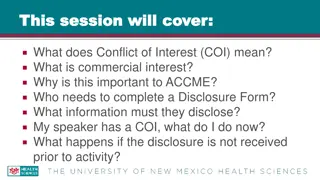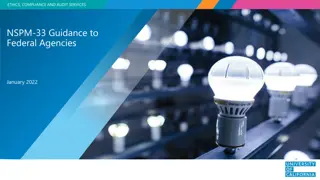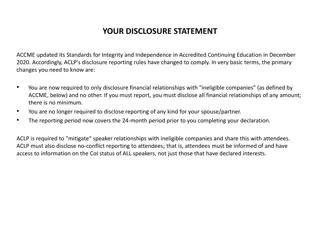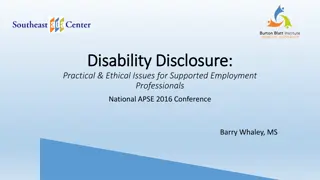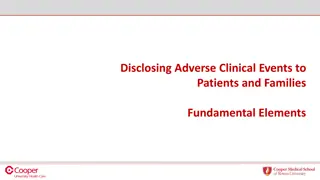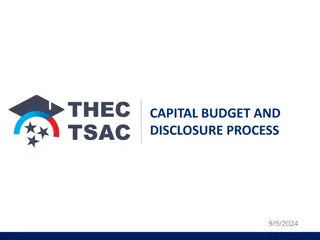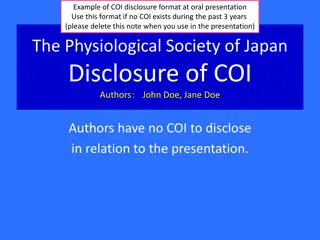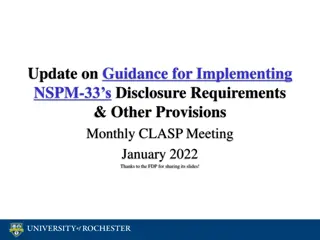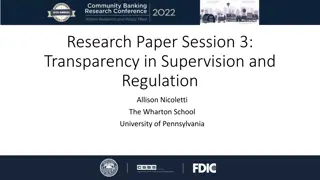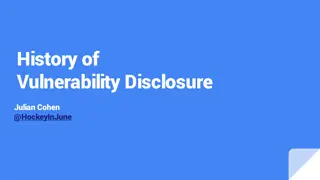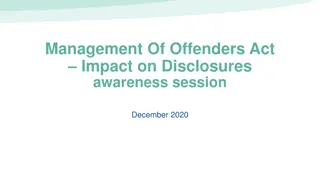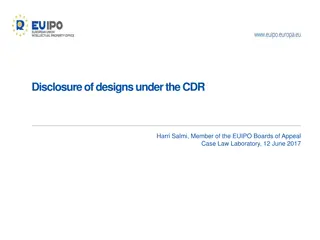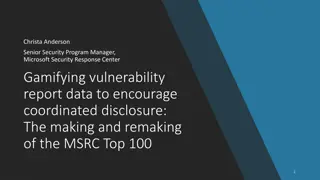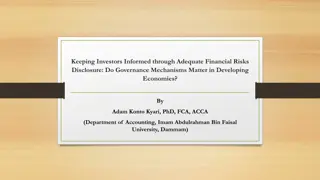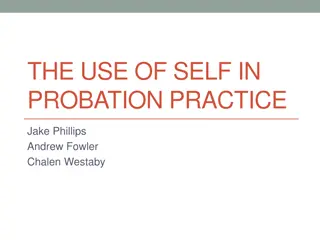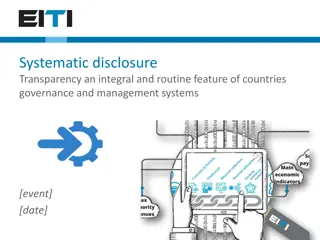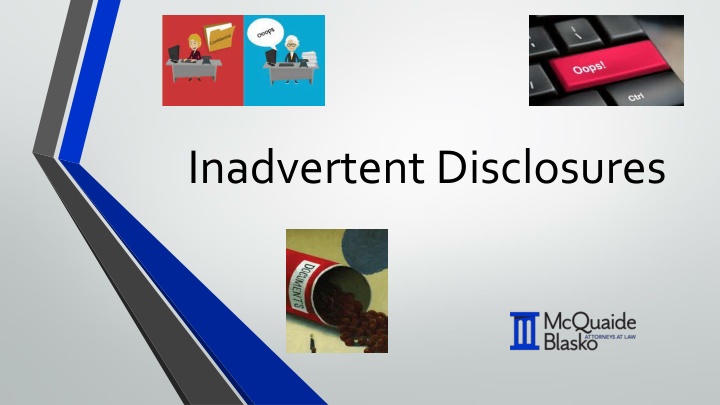
Privileges and Inadvertent Disclosures in Legal Practice
Learn about attorney-client privilege, work product doctrine, and other legal privileges, as well as the importance of preventing inadvertent disclosures in legal communications. Explore the responsibilities of attorneys and the scope of protected information in various contexts.
Download Presentation

Please find below an Image/Link to download the presentation.
The content on the website is provided AS IS for your information and personal use only. It may not be sold, licensed, or shared on other websites without obtaining consent from the author. If you encounter any issues during the download, it is possible that the publisher has removed the file from their server.
You are allowed to download the files provided on this website for personal or commercial use, subject to the condition that they are used lawfully. All files are the property of their respective owners.
The content on the website is provided AS IS for your information and personal use only. It may not be sold, licensed, or shared on other websites without obtaining consent from the author.
E N D
Presentation Transcript
Presenters Sean Burke, President and Managing Director, Hollidaysburg Business and Corporate Law Estate Planning and Administration Financial Services Mergers and Acquisitions Real Estate Law Carolyn Smith, Shareholder, Hershey Business and Corporate Law Civil Litigation Estate Planning and Administration Labor and Employment Law Professional Negligence Defense Philip Miles, Shareholder, State College Civil Litigation College and University Law Labor and Employment Law
Privileges Attorney-Client Privilege Exists to encourage open and honest communication between the client and attorney. Protects from disclosure to third parties of confidential communications between an attorney and a client made for the purpose of obtaining (or providing) legal advice. Person asserting privilege must be a client or someone seeking to be a client. Person to whom communication was made must be a member of the bar association. The communication must relate to a fact that the attorney was informed of by the client in a confidential setting, without the purpose of committing a crime or tort. Privilege belongs to the client. 42 Pa. C.S.A. 5928 Work Product Doctrine Subject to the provisions of Rules 4003.4 and 4003.5, a party may obtain discovery of any matter discoverable under Rule 4003.1 even though prepared in anticipation of litigation or trial by or for another party or by or for that other party s representative, including his or her attorney, consultant, surety, indemnitor, insurer, or agent. The discovery shall not include the disclosure of the mental impressions of a party s attorney or his or her conclusions, opinions, memoranda, notes or summaries, legal research or legal theories. With respect to the representative of a party other than the party s attorney, discovery shall not include disclosure of his or her mental impressions, conclusions or opinions respecting the value or merit of a claim or defense or respecting strategy or tactics. Pa. R.C.P. 4003.3 Who can create work product? A party s attorney; A party, at the direction of their counsel; A non-party representative (i.e. an investigator, a consultant, an accountant).
More Privileges News Reporters 42 Pa. C.S.A. 5942. Clergy 42 Pa. C.S.A. 5943. Psychiatrists or Licensed Psychologists 42 Pa. C.S.A. 5944. School Personnel 42 Pa. C.S.A. 5945. Mediation Communications and Documents 42 Pa. C.S.A. 5949. Law Enforcement Officers 42 Pa. C.S.A. 5950. Accountant-Client Privilege 63 P.S. 9.11a.
Inadvertent Disclosure When a privilege exists, an attorney has a duty to make reasonable efforts to prevent the disclosure of the privileged information, including through inadvertent disclosure. Pa. R.P.C. 1.6 (d). A document is inadvertently sent when it is accidentally transmitted, such as when an email or letter is misaddressed or a document, including electronically stored information, is accidentally included with information that was intentionally transmitted. For purposes of this Rule, "document, including electronically stored information" includes paper documents, email and other forms of electronically stored information, including embedded data (commonly referred to as "metadata"), that is subject to being read or put into readable form. Pa. R.P.C. 4.4 Explanatory comment 2
Is Rule 1.6(d) Violated if You Inadvertently Disclose a Privileged Document? The unauthorized access to, or the inadvertent or unauthorized disclosure does not constitute a violation of Rule 1.6(d) if the lawyer has made reasonable efforts to prevent the access or disclosure. Factors to be considered in determining the reasonableness of the lawyer's efforts include, but are not limited to: the sensitivity of the information the likelihood of disclosure if additional safeguards are not employed the cost of employing additional safeguards, the difficulty of implementing the safeguards the extent to which the safeguards adversely affect the lawyer's ability to represent clients (e.g., by making a device or important piece of software excessively difficult to use). Pa. R.P.C. 1.6 Explanatory comment 25
Is the Privilege Waived if a Document is Inadvertently Disclosed? The privilege is not automatically waived if a document is inadvertently disclosed. Pennsylvania courts weigh the following factors to determine whether an inadvertent production of privileged documents waived the privilege. The reasonableness of the precautions taken to prevent inadvertent disclosure in view of the extent of the document production The number of inadvertent disclosures The extent of the disclosure Any delay and measures taken to rectify the disclosures Whether the overriding interests of justice is served by relieving a party of its error. Carbis Walker, LLP v. Hill, Barth and King, LLC, 930 A.2d 573, 582 (Pa. Super. 2007) (quoting Fidelity & Deposit Co. v. McCulloch, 168 F.R.D. 516, 522 (E.D. Pa. 1996)).
What To Do If You Inadvertently Disclose a Privileged Document? Act quickly Demand the return and/or segregation of inadvertently disclosed materials Object to any and all testimony concerning inadvertently produced materials Address the Court if necessary According to Rule 502(b) of the Federal Rules of Evidence, when made in a federal proceeding, the disclosure does not operate as a waiver in a federal or state proceeding if: the disclosure is inadvertent; the holder of the privilege or protection took reasonable steps to prevent disclosure; and the holder promptly took reasonable steps to rectify the error. Rule 502 only helps those who help themselves. Rule 502(b)does not apply to intentional disclosures of privileged materials, and it only protects inadvertent productions where the producer took reasonable steps to prevent disclosure.
What To Do If You Receive An Inadvertent Disclosure A lawyer who receives a document, including electronically stored information, relating to the representation of the lawyer s client and knows or reasonably should know that the document, including electronically stored information, was inadvertently sent shall promptly notify the sender. Pa. R.P.C. 4.4(b) Some lawyers may choose to return a document or delete electronically stored information unread, for example, when the lawyer learns before receiving it that it was inadvertently sent. Where a lawyer is not required by applicable law to do so, the decision to voluntarily return such a document or delete electronically stored information is a matter of professional judgment ordinarily reserved to the lawyer. See Pa. R.P.C. 1.2, 1.4. Pa. R.P.C. 4.4 Explanatory comment 3
Tips for Receiving Lawyers The following steps should be followed if documents that you believe may be privileged are inadvertently sent to you. Stop reading the documents. Draft a memorandum describing the facts revealed to you and briefly describe without looking at the detailed contents of the documents. Sequester and secure the documents and memorialize them. Draft a letter to the sending attorney giving notice of the revelation, demanding an immediate response regarding any claim of privilege, with a description of the required privilege log. Do not waive the right to demand that the documents be produced, and do not concede the privilege claim. Inform the sending attorney that you are submitting the material to the court, under seal, and requesting that the court rule on it at a hearing unless the defendant waives the privilege before then. Draft and send a pleading notifying the court of the documents, filing them under seal. The longer you wait to inform the other side and the further you read into the inadvertent disclosed document, the more likely sanctions will be levied upon you.
How to Avoid the Doing Discovery the Alex Jones Way After realizing that there was an inadvertent disclosure, Alex Jones Attorneys needed to: Act quickly Demand the return and/or segregation of inadvertently disclosed materials Object to any and all testimony concerning inadvertently produced materials Address the Court if necessary Alex Jones Attorneys needed to not only act after the inadvertent disclosure, but needed to also take care before the disclosure.
How to Take Care Before an Inadvertent Disclosure Counsel should consider stipulating to "clawback" procedures and "no inadvertent waiver of privilege" provisions to protect against any challenges to, or findings of, waiver of privileges. A clawback agreement generally is used in two situations: The lawyer turns over a client's file without having conducted a privilege review and demands the right to "clawback" any privileged documents that may be discovered subsequently The lawyer conducts a privilege review but, recognizing that mistakes can be made, reaches an agreement with opposing counsel to return any privileged documents that may have been produced inadvertently
Tips for Sending Lawyers On all outgoing documents include the appropriate disclaimers indicating: Privileged & Confidential Attorney-Client Communication Attorney Work Product Create a multi-level review system to search and remove privileged documents from discovery Avoid using Reply All feature in replying to e-mail Avoid using Speed Dial feature for facsimile transmissions instead manually punch in numbers Be cautious when disconnecting from conference calls With respect to all modes of communication check carefully before sending If you don t know and trust your adversary, guard your files
Tips for Sending Lawyers Eliminate metadata with scrubbing programs Train personnel to use programs that clean and seal documents before sending them to a third person Establish policies and procedures to apply to all outgoing documents Avoid sending the electronic document in the first place Save and transmit documents in non-electronic formats, such as: Hard copy; Create an image; and Print and fax
Questions? Thank you!

